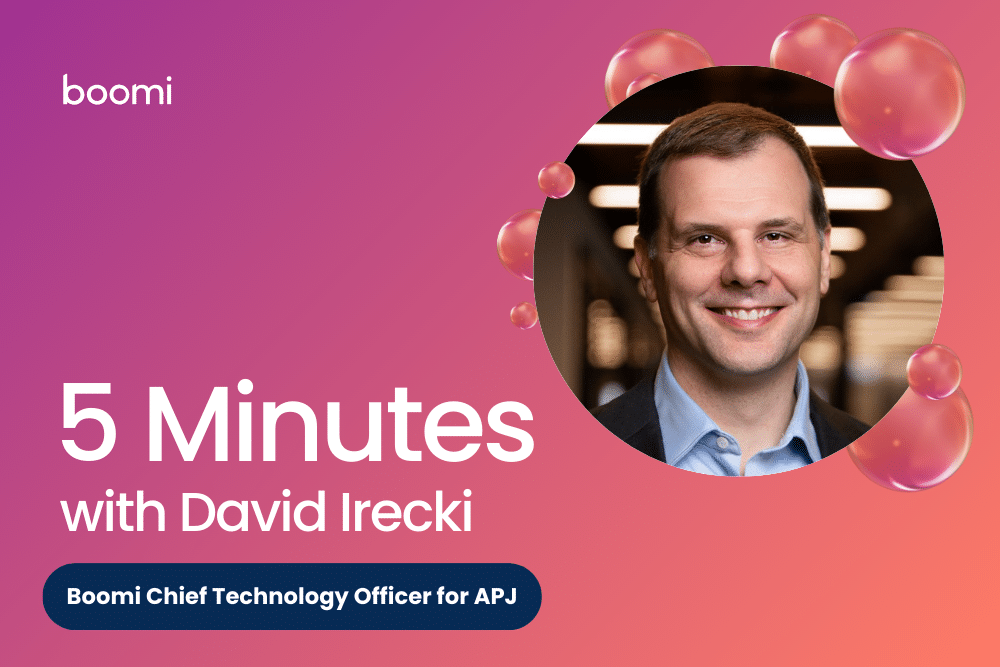Boomi highlights business thought leaders, trends they see, and the cool things their organizations are doing. We also get their hot takes on how automation could improve their everyday lives.
Nearly 25 years ago, David Irecki’s final paper for his university engineering degree in New Zealand involved license plate recognition. The idea was that cars would pull into petrol stations, and the drivers would get billed automatically for the fuel they pumped based on the vehicle identification.
“I was using neural networks and training them to understand the characters on the license plates,” Irecki said. “Fast-forward to today, and we know that neural networks are a fundamental technology that enables generative AI. They’ve greatly improved, but this technology has been around for a long time.”
It’s not surprising that Irecki, Boomi’s chief technology officer and director of solution consulting for the Asia Pacific and Japan region, is a passionate artificial intelligence evangelist. He’s a highly sought-after public speaker and media interview subject about how businesses can set themselves up for success with generative and agentic AI. Irecki always highlights the need for a foundational layer of well-connected applications and trustworthy data – Boomi’s specialty.
“We look at a business’s applications and data sources, connect those together for data liquidity, then improve the data quality, and this sets them up for the new world of agentic transformation,” he said. “Businesses have long been on a digital transformation journey. But what further efficiencies or outcomes can they get by automating processes with AI? We help them understand how AI fits their business and how best to get value and ROI.”
Irecki took time to discuss his long-standing fascination with AI, common misconceptions, and possible long-term implications of the technology. The conversation was lightly edited for length and clarity.
How do you describe what Boomi does, to someone you might meet at a social gathering?
David Irecki: I help businesses understand what they can do with technology to add value to their outcomes and where Boomi can help. So, if I were at a picnic, I’d ask someone to tell me a little about themselves and their job. If they say, as an example, they’re in HR and are hiring new staff, onboarding employees, working out compensation, etc, I’ll make Boomi relatable to that story. That is, Boomi helps automate these processes, making sure they get the right information about the candidate, connect to third parties for reference checks, simplify internal approvals, automatically order the right IT equipment, etc, enhancing the onboarding experience. Boomi provides the technology to enable this.
What are some common misunderstandings about AI?
David Irecki: There’s still a general divide around what AI is. We’re moving forward to this new agentic world, and people don’t often understand the difference between generative AI and agentic AI. Generative AI often acts as a reactive tool based on a user’s prompts, like performing a knowledge search. Agentic AI is more about letting agents do some of the decision-making and take actions, with minimal human intervention. It’s more than just ChatGPT or co-pilots.
Businesses are struggling to see value in AI, according to prominent studies. What are your thoughts on this?
David Irecki: When ChatGPT exploded onto the scene, all you had to say was “AI,” and the C-suite/Board threw money at you to “do something” because of the fear of missing out. But fast-forward three years, and they’re now looking for value and ROI from AI use cases. There’s a very clear foundational story businesses need to understand to be successful with AI. Many don’t have their applications and data connected. So, they have very poor data liquidity. Plus, their data is siloed, leading to data quality issues. Without fixing this, AI will not provide the outcomes the business expects. That foundational layer is very key. It’s also important to understand what use cases make sense for AI.
What makes the APJ region unique in terms of how businesses view technology?
David Irecki: I grew up in New Zealand, and we always had this ethos that the Kiwis could solve any problem with Number 8 fencing wire. We’re very ingenious and resourceful. I’ve now been in Australia for 13 years, and I’ve seen that the ANZ market is a test bed for what will be seen in America in two to three years’ time. There’s a lot of innovation that happens out here. The market is small and safe enough to try new ideas and see where they go. But I’ll also say expanding that out to Asia and Japan is interesting because many businesses and countries are still grappling with the start of their digital transformation journeys. So, there are some varying perspectives in our region.
Gemini told me you play badminton, but then I read an interview where you said you’re a squash player. Did AI get that wrong?
David Irecki: AI only knows what the data tells it. Different models are trained on different datasets. One model probably said badminton because it had access to an old LinkedIn profile or CV floating around somewhere. So, it knows that I played badminton in high school and at university. But now, my wife and I enjoy regular friendly games of squash together. It’s always about context, and that goes back to the foundational layer story. If you don’t have the right applications and data sources connected together with the right data feeding AI, you won’t get the right answer to your question.
What’s something in your non-work life that you wish could be automated?
David Irecki: Let me answer that question from a different perspective. I think a lot about the impact of technology on my three boys. Once they came home from school with an assignment, and reading it, I thought, “Wow, this is amazing. I didn’t know you knew this word or knew this fact.” Then, you start to realize that some of it is their research and some of it is ChatGPT, because that’s what they are now using at school. It’s become their “co-pilot” for learning. So, it’s interesting how technology is infiltrating my kids’ education. I worry about that because I hope we don’t lose skills like critical thinking and analysis. What I’m seeing with my children already is the impact AI will have on the next generation.
What’s something you do to take a break from tech?
David Irecki: Growing up, we had a large vegetable garden and would smoke our own meats. We’ve just got a small veggie garden here in Sydney, and it’s good for our boys to understand where their food comes from. I love spending as much time as possible with family, too. Given all the great things Sydney has to offer, we look to get out as much as possible, whether it’s bike riding, going to the beach, walking along the harbor, visiting museums, bowling/mini-golf, or even trying indoor skydiving!
Up Close With David Irecki
 Role: Boomi CTO and Director of Solution Consulting for the APJ region
Role: Boomi CTO and Director of Solution Consulting for the APJ region
Home: Sydney
Family: Married, three children
Education: Bachelor of Engineering from Massey University (New Zealand)
Career: Over 20 years of experience in enterprise integration and embedded computing, including a decade at Boomi in Solution Consulting leadership roles, where he has seen the APJ team grow from two people to about 200. Previous roles included leading a solutions consulting team at MuleSoft and engineering positions at other companies.
Interest in technology: Blossomed with a family IBM Personal Computer XT around age seven. “Dad and I pulled it apart and had a look inside. As soon as I could afford it, I started building my own computers. We also used to have a store in New Zealand called Dick Smith, where I was always buying resistors and diodes to build little electronic projects.”
If you found this post interesting, check out our thought leadership profile page to read more interviews.


 English
English 日本語
日本語